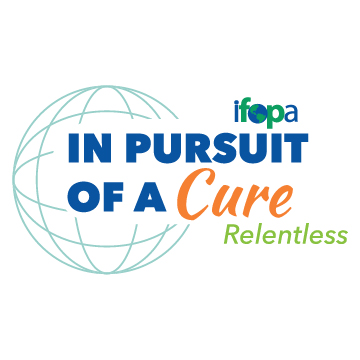
by Megha Shree | Nov 30, 2023 | Uncategorized
From a readership of 11 in 1988 to more than 2,000 in 2023, the IFOPA newsletter has evolved to inform and connect friends across the world
Together with her sister-in-law, Anne, and fellow IFOPA founding member, Nancy Sando, Jeannie Peeper published the first edition of the FOP Connection in 1988. Back then, it looked quite a bit different from the version you’re reading today.
“It was very basic,” said Jeannie. “It was done on a typewriter, copied and mailed out.”
Jeannie got the idea to bring people living with FOP together after Dr. Michael Zasloff gave her the names of 18 other people with FOP.
“I wanted to help end the isolation many of us felt,” she said.
Jeannie wrote to the others to gather details like names, birthdays and hobbies, and 11 of the 18 responded. Jeannie invited those that wrote back to be Founding Members of the IFOPA. Information they sent back helped create the first newsletter.
“It was a way to share everyone’s information, connect and build friendships,” she said.
In 2010, FOP Connection moved online.
Thirty-five years later, the FOP Connection still functions in a similar manner, just on a massively different scale. A readership of 11 in 1988 has exploded to more than 2,000 in 2023.
Just like our organization, it’s remarkable to see how the newsletter has evolved to serve a growing audience yet remained committed to providing a personal connection and welcoming community for everyone.
FOP Connection provides people across the world with the latest research and clinical trial news, information about IFOPA programming, community updates, support and more to better navigate life with FOP.
It’s been so special to see FOP Connection blossom into what it is today.
Thank you, Jeannie, for creating such a wonderful way for our community to connect!

by Megha Shree | Nov 30, 2023 | Uncategorized
L.I.F.E. Award Grant makes it easier for professional with FOP to work from home
Kathleen Degenhardt works from home. She also has FOP, which makes it difficult for her to perform some tasks. She learned about the Harold & Elaine Kaplan Quality of L.I.F.E. Award program while reading the IFOPA monthly newsletter and applied.
The program provides grants to people living with FOP. Recipients can use the assistance to purchase tools and make improvements to help them perform daily tasks. Whether that be in the form of home modifications or comfort, school, workplace, communication or mobility aids is up to them. Kathleen used it to purchase an adjustable-height desk.
“It’s made working from home easier because instead of using books to make my keyboard the correct height, I’m able to press a button to do it,” she said. “As my body changes, I can easily adjust it so I can continue to work.”
Now that she can sit straighter and be more comfortable while working, Kathleen said that many tasks have become easier and are more enjoyable. She is grateful for the improvement and hopes the program can help others.
“As members of the FOP community, we live challenging lives and struggle to do everyday tasks,” she said. “Sometimes simple things can make such a big difference and make life easier.”
As the IFOPA continues to expand and reach new communities around the world, demand for this type of assistance is growing. For those looking to help people living with FOP, supporting the Quality of L.I.F.E. Awards is one of the best ways to have a direct impact.
“Your support of the program means a lot and provides all sorts of items to FOP members,” Kathleen said. “This kind of immediate, personalized assistance has been life-changing.”
Learn more about the L.I.F.E. Award program or donate to provide direct support to someone living with FOP.

by Megha Shree | Nov 30, 2023 | Uncategorized
Connect with FOP researchers, meet new families and more!
You’ll notice a few things are brand new for this year’s In Pursuit of a Cure campaign. But the most important part of the campaign is the same — you! Read on for a quick update on some exciting changes and what they mean to you in the weeks ahead…
We’ve supercharged In Pursuit of a Cure 2023 with some updates that make it easier for you to:
- Support FOP research
- Share videos, social posts and good news
- Ask questions and get information direct from FOP researchers
Changes for 2023 include:
- A signature campaign video available to watch right NOW instead of a one-hour video to watch at the end of the campaign
- A LIVE webinar on August 30 (3 viewing times offered) with leading FOP researchers where you can ask questions and interact in real-time. Live translation in Spanish and AI (artificial intelligence) translation available in 27 languages. Register at ifopa.org/curefop_webinar
- Brand new videos from members of the worldwide FOP community created for you to share with your family and friends
We still have the match to double the first $25,000 we receive in donations!
There’s no reason to wait if you plan to make a gift to help advance the next phase of transformational FOP research. The campaign is full speed ahead right now!
Please join us in the relentless pursuit of a cure today to:
We’re on this path together for as long as it takes. Together, we are Relentless!
by jay | Feb 12, 2019 | Uncategorized

MONTREAL, Feb. 11, 2019 (GLOBE NEWSWIRE) — Clementia Pharmaceuticals Inc. (Nasdaq: CMTA), a clinical-stage biopharmaceutical company innovating treatments for people with ultra-rare bone disorders and other diseases, today announced that the U.S. Food and Drug Administration (FDA) has granted Rare Pediatric Disease designation to palovarotene for the treatment of fibrodysplasia ossificans progressiva (FOP). Palovarotene, an investigational therapy for FOP, has previously been granted Orphan Drug, Fast Track and Breakthrough designations by the FDA for FOP.
“FOP is a rare, devastating disease that begins to irreversibly impact individuals in childhood,” said Clarissa Desjardins, Ph.D., founder and chief executive officer of Clementia. “The receipt of this designation highlights the urgent need for a treatment for people with FOP. The entire Clementia team is working towards an NDA submission in the second half of 2019 in hopes of achieving our first regulatory approval, an important step toward achieving our mission of bringing innovative and effective treatments to individuals who currently have none.”
In October 2018, based on a meeting with the FDA, Clementia announced that the Agency was supportive of the company’s plan to submit a New Drug Application (NDA) for palovarotene for the prevention of heterotopic ossification (HO) associated with flare up symptoms in patients with FOP. The FDA based its assessment on the efficacy and safety data generated in the completed Phase 2 clinical program. The company’s NDA preparations are underway, with a submission targeted for the second half of 2019. If approved, Clementia expects a first commercial launch for palovarotene in 2020.
The Rare Pediatric Disease Designation qualifies investigational palovarotene for a Rare Pediatric Disease Priority Review Voucher (PRV), granted at the time of NDA approval. The PRV Program is intended to encourage development of therapies to prevent and treat rare pediatric diseases. This PRV can be redeemed to receive a priority review of a subsequent marketing application or sold to a third party.
Source : Clementia Pharmaceuticals Inc.

by jay | Oct 24, 2018 | Uncategorized
NDA Submission Planned for the Second Half of 2019
MONTREAL, Oct. 23, 2018 (GLOBE NEWSWIRE) — Clementia Pharmaceuticals Inc. (Nasdaq: CMTA), a clinical-stage biopharmaceutical company innovating treatments for people with ultra-rare bone disorders and other diseases, today announced that it plans to submit a New Drug Application (NDA) for palovarotene to the U.S. Food and Drug.
Administration (FDA) in the second half of 2019. Based on recent interactions between Clementia and the FDA, including a Type B meeting held earlier today as part of palovarotene’s Breakthrough Therapy Designation, the FDA has agreed that available data would support filing of an NDA for palovarotene for the prevention of heterotopic ossification (HO) associated with flare up symptoms in patients with fibrodysplasia ossificans progressiva (FOP). The FDA based its assessment on the efficacy and safety data available from the completed Phase 2 clinical program, which showed a statistically significant reduction in mean new HO volume, or bone volume, associated with flare-ups of FOP at 12 weeks as compared to placebo or untreated flare-ups.
The data provided to the FDA included the results from Clementia’s Phase 2 studies, which were recently presented at ASBMR 2018. In these studies, 92 palovarotene-treated flare-ups in 62 patients across three different dosing regimens were evaluated compared to 46 placebo or untreated flare-ups in 41 patients from the Company’s natural history study. Patients treated with palovarotene at the time of a flare-up demonstrated a greater than 70 percent reduction in mean new HO volume at 12 weeks compared to the untreated group. Further, the reduction in mean new HO volume among those treated with the episodic 20/10 mg dosing regimen (20 mg for 4 weeks starting at the time of a flare-up followed by 10 mg for 8 weeks) was statistically significant (p=0.02). Palovarotene was generally well tolerated across all dosing regimens of the Phase 2 clinical program. There were dose-related increases in retinoid-associated adverse events (AEs) with most being mild or moderate in severity, and only one patient discontinued participation in the study because of an AE.
Following the completion of standard non-clinical, clinical pharmacology and CMC studies to be agreed upon with the FDA, Clementia plans to submit its NDA in the second half of 2019 to seek approval of the palovarotene 20/10 mg episodic dosing regimen.
“The identification of a path to an NDA submission in the second half of 2019 is a significant milestone for Clementia and for patients with this ultra-rare and devastating genetic bone disease,” said Clarissa Desjardins, Ph.D., founder and chief executive officer of Clementia. “We are thankful for the collaboration with the FDA’s Division of Bone, Reproductive and Urologic Products, potentially bringing the first approved treatment option to individuals affected by FOP. We are also grateful to the patients and their families, as well as the investigators and clinical sites, without whom none of this work would have been possible.”
Clementia’s ongoing Phase 3 MOVE Trial will continue as planned, evaluating a dosing regimen of palovarotene which includes a chronic 5 mg daily dose in addition to the episodic 20/10 mg dosing regimen at the time of a flare-up. The Company believes that, if successful, the data from the MOVE Trial may provide the basis for a supplemental NDA for an additional treatment regimen option for patients with FOP.
Clementia also plans to engage international regulatory authorities in 2019 to discuss the registration strategy for palovarotene and anticipates providing an update at a later stage.
Source : Clementia Pharmaceuticals Inc.

by fopindia | Oct 4, 2018 | Uncategorized
Blueprint Medicines Corporation, a leader in discovering and developing targeted kinase medicines for patients with genomically defined diseases, today announced preclinical proof-of-concept data for BLU-782, an investigational oral precision therapy specifically designed to target mutant activin-like kinase 2, the underlying cause of fibrodysplasia ossificans progressiva. Preclinical studies in a well-characterized, genetically accurate FOP model showed BLU-782 prevented injury- and surgery-induced heterotopic ossification, reduced edema and restored healthy tissue response to muscle injury. The data were presented on September 30 in a plenary oral session at the 2018 American Society for Bone and Mineral Research Annual Meeting in Quebec, Canada.
“We are excited to report preclinical proof-of-concept data for BLU-782, a highly selective oral inhibitor of mutant ALK2, the underlying cause of FOP,” said Marion Dorsch, Ph.D., Chief Scientific Officer of Blueprint Medicines. “Despite the discovery of the FOP gene more than a decade ago, prior efforts to develop a selective ALK2 inhibitor faltered due to persistent technical challenges. By leveraging our proprietary compound library and expertise in structure-guided medicinal chemistry, we overcame these challenges and successfully designed BLU-782 to selectively target mutant ALK2. The new preclinical data reported at the ASBMR Annual Meeting showed BLU-782 prevented abnormal bone growth in a well-characterized FOP model, validating selective ALK2 inhibition as an important potential therapeutic strategy.”
FOP is a rare genetic disorder characterized by the abnormal transformation of skeletal muscle, ligaments and tendons into bone, either spontaneously or as the result of physical trauma. FOP is caused by a mutation in the gene for ALK2, which is known as ACVR1, that causes hypersensitivity to certain bone morphogenetic proteins (BMP) and a neomorphic response to activins.
In the preclinical data presented at the ASBMR meeting, BLU-782 demonstrated exquisite selectivity for R206H mutant ALK2 in cellular assays, while sparing closely related anti-targets including ALK1, ALK3, and ALK6. Additionally, BLU-782 potently inhibited mutant ALK2 in vitro, regardless of the activating ligand, including Activin A, Activin B and BMP6. In vivo studies in a conditional knock-in ALK2R206H transgenic mouse model showed BLU-782 prevented the formation of injury-induced HO and edema, as measured by micro computed tomography and magnetic resonance imaging. Immunohistochemistry analyses also showed restoration of a healthy response to tissue injury in ALK2R206H mice, including skeletal myofiber regeneration. In addition, BLU-782 prevented the formation of surgery-induced HO following fibular osteotomy surgery in ALK2R206H mice.
“Given the disabling and destructive nature of this disease, people living with FOP have a desperate need for a safe and effective treatment,” said Adam Sherman, Research Development and Partnerships Director at the International Fibrodysplasia Ossificans Progressiva Association. “We are immensely grateful to have companies like Blueprint Medicines developing new treatments for those living with FOP. We look forward to seeing BLU-782 advance through the development pathway and hope a therapeutic option will one day change the course of this disease.”
Blueprint Medicines expects to submit an investigational new drug (IND) application for BLU-782 by the end of 2018, and subject to approval of the IND application by the U.S. Food and Drug Administration, plans to initiate a Phase 1 clinical trial in healthy volunteers in the first quarter of 2019. In addition, Blueprint Medicines plans to continue working with clinical experts and the patient community to design a potential Phase 2 clinical trial of BLU-782 in patients with FOP.
Source: Blueprint Medicines





